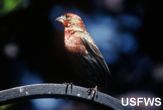Bad Singing Leads to Virtuoso Performances in Birds

Baby birds learning to sing tend to scramble their tunes upon waking, but their jazzy morning improvisations actually advance their progress later in the day and over time, new research shows.
In fact, scientists learned, bad singing early on can lead to chart-topping performances later. The findings might help scientists better understand similar learning habits of babies.
The overall daily pattern is two steps forward, one step back, says Sebastien Deregnaucourt of the City University of New York, who is part of a team of scientists that did careful experiments with two-month- and three-month-old zebra finches to determine the effect of sleep on how they learn to sing.
The step back has nothing to do with grogginess.
Instead, sleep induces early morning improvs that result in net progress two or three hours later, trending ultimately toward perfection in about seven weeks time, Deregnaucourt said. This sleep-triggered cycling is integral to the long-term learning process, according to the findings published in the Feb. 17 issue of the journal Nature.
Babies do it, too
The results have implications for how other animals learn and even how young children learn things like how to speak and other tasks they use for the rest of their lives.
Sign up for the Live Science daily newsletter now
Get the world’s most fascinating discoveries delivered straight to your inbox.
Similar cycling has been found in bumblebees learning to approach and probe unfamiliar flowers -- they improved later in the day but then lost skills overnight. Human babies' movements progress over days and months from simple to complex, but after naps, they need to "warm up" with simple movements. The same was found with young rats.
But the direct relationship between sleep and learning in bees, babies, and rats is unknown. This research is the first to make the link between sleep, "rustiness" or improvisation, and early-life or developmental learning.
Like the process of tempering steel, which is first weakened to later gain its ultimate structure and strength, the zebra finches' songs typically deteriorated in the early morning compared to their previous day's achievements. Later in the day, they made progress beyond what they had mastered the day before.
"Vocal imitation improves from day to day, but surprisingly, we observed a deterioration of song structure during the night," Deregnaucourt told LiveScience. "This 'one step back, two steps forward' pattern might help the birds to consolidate their vocal abilities while giving themselves the chance to improve their imitation by relearning song sequences."
In fact, the worse the zebra finches sang in the morning, compared to the previous day, the better their overall mastery was in the long run.
Younger birds benefited more from their sleep-induced improvs than older ones.
Rehearsals
The birds rehearse their tunes while they are sleeping, brain activity studies suggest, but rather than diving right into perfectionism in the early morning, the birds tend to initially play around with intense innovations and experimental notes based on the previous day's progress.
Birds sleep with their eyes closed and their heads tucked under their wings. Their breathing slows down but they usually sleep upright on a perch.
The zebra finches were raised in soundproof training boxes where they were trained to mimic quick ditties by pecking a key that played back recordings of an adult song in the wild. The songs usually last just for a second and are repeated in bursts of five to 10 seconds.
Like humans, songbirds can't help but try to imitate complex songs, or vocalizations, that they hear. Zebra finches learn their songs in their second and third months after hatching.
The scientists used zebra finches because they are a good model animal for ornithologists and learn their songs in less than four months.
In humans, it is known that sleep affects brain development and that children with persistent sleep disorders are more likely to have behavioral problems. Sleep helps us cement knowledge into memories, and it probably affects young children's ability to master life skills, such as talking, Deregnaucourt said.
It is much harder to study this process in humans than in birds, however, because we are comparatively slow learners.
Editor's Note: The image at the top of this page is of a house finch. Pictures of zebra finches are available at the Zebra Finch Society website.
Robin Lloyd was a senior editor at Space.com and Live Science from 2007 to 2009. She holds a B.A. degree in sociology from Smith College and a Ph.D. and M.A. degree in sociology from the University of California at Santa Barbara. She is currently a freelance science writer based in New York City and a contributing editor at Scientific American, as well as an adjunct professor at New York University's Science, Health and Environmental Reporting Program.










